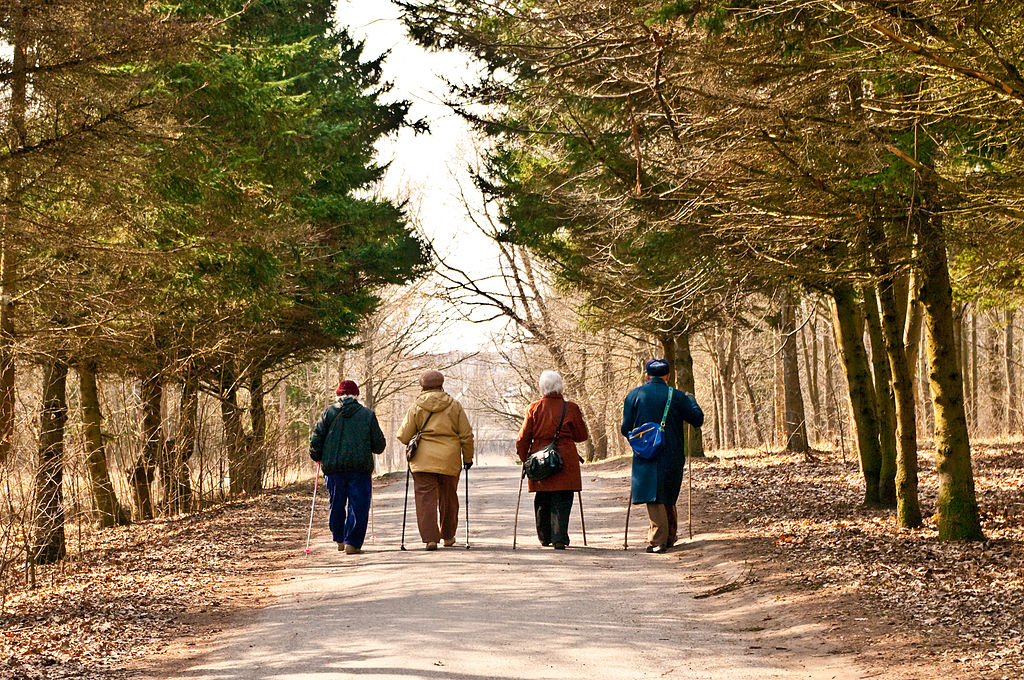Music therapy can help Alzheimer’s patients with memory.
Image source: www.wikimediacommons.org, by Sarah Wulfeck.
Art washes from the soul the dust of everyday life.
— Pablo Picasso
When it comes to healing, art is one of the best tools we have available. The field of art therapy is known to have a positive effect on the lives of seniors — there is no such thing as too much creative expression. Practicing art under the guidance of professional therapists and art teachers offers elderly people a supportive space in which to share their inner emotions, accept challenging situations, and embrace their ever-shifting identities.
As older adults move through myriad transitions, including loss of control and illness, creative-arts programming increases in importance. It empowers seniors to express themselves creatively, and tap into uncomfortable emotions. The benefits of creative expression are not just limited to visual arts like painting and drawing; engaging in dance, music, and performance has been proven to be helpful for seniors, too.

Image source: www.wikimediacommons.org, by Enric Naval
Dancing to help dementia
Moving our bodies is fun and feels good — but there’re more benefits to moving; movement has been proven to help stave off illnesses like dementia. “A study by the Albert Einstein College of Medicine reveals that stimulating the brain through social dance can ward off dementia, just as physical exercise keeps the body fit.” Dancing transforms the attitudes of seniors, both those with and without dementia. They go from focusing on pain, depression, and age-related issues to feeling happy in the present moment, and smiling. And what’s better than that? A dance instructor who offers dance classes to seniors with dementia explains the intrinsic value that dancing holds for elderly people with mental illnesses:
“Sometimes they won’t even remember 20 minutes later that you danced with them, and it’s not that important. What this does, is it creates moments. It gives you the now. It allows you to not have to relate to anything but what you’re doing at the moment, and what you’re doing, you’re enjoying.”
Music therapy for Alzheimer’s
Music, meanwhile, is another art form that has numerous therapeutic benefits, many of which are currently being explored by scientists and psychologists in the field. Specifically, many industry experts have pinpointed music as being particularly beneficial for Alzheimer’s patients. Along with neurologist Dr. Oliver Sacks, social worker Dan Cohen is investigating the connection between music, our brains, and Alzheimer’s. Their journey was initially inspired when Cohen decided to “bring iPods to a nursing home. To his and the staff’s surprise many residents suffering from memory loss seem to ‘awaken’ when they are able to listen to music from their past.” By stimulating the brain, music can help seniors to heal.

Image source: www.wikimediacommons.org, by Jan Jankovi?.
Creative arts programming
For these reasons, the Institute on Aging has been encouraging creative arts programming for seniors since 1978. And like IOA’s numerous other services for the elderly and their caregivers, the arts program serves seniors who are living at home, as well as those who prefer to visit a center.
Since its original inception, the arts program has naturally expanded into a Center for Elders and Youth in the Arts, which involves the creative youth of San Francisco. This program enables the younger generation to learn from the seniors and vice versa. “The goal is to build social capital by creating a supportive and productive environment where a sense of pride, compassion, and learning can occur with both the elder and youth participants.” As the first of its kind in the country, this arts programming for seniors has received honorable recognition from several national organizations.
Seniors who have had the opportunity to experience the program acknowledge its effects. Born in 1935, Susan Sun thoughtfully shares her thoughts: “Since I started taking CEYA art class, my mental state has greatly improved. I feel like I have something to look forward to. Being able to make art and be creative is fulfilling my wish in old age.” By using art and creativity as a bridge between the two demographics, this intergenerational program uses art, dance, music and more to inspire its participants creatively and spiritually. Arts programming such as this reveals the limitless potential in seniors — and the power of creative expression.
If you are unsure of how to best help an aging loved one, the trained and compassionate staff at the Institute on Aging is here to help you make that decision and gain the best in at-home senior care. Contact us to find out more.







